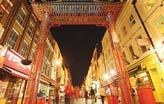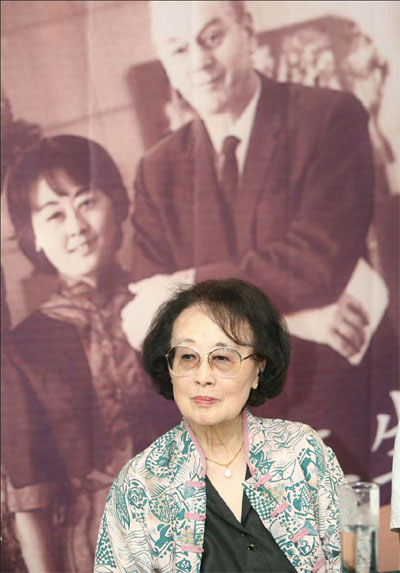Her story is history
Updated: 2011-05-13 13:45
By Liu Jun (China Daily)
Hualing Nieh Engle has been at the heart of the International Writing Program at the University of Iowa
|
|
When Chinese writer Ding Ling (1904-1986) arrived at the International Writing Program (IWP) at the University of Iowa in 1981 the program's co-founder Hualing Nieh Engle thought her to be a warm person. "When we were in a garden, she clapped her hands with joy and said, 'Lovely, lovely!'" recalls Nieh, 86.
In her spacious sitting room overlooking the Iowa River, writers from the Chinese mainland, Taiwan and Hong Kong chatted, danced and sang with writers from the rest of the world, regardless of their political opinions.
As Nieh and her husband, American poet/writer Paul Engle (1908-1991), took Ding and her husband Chen Ming back to the Mayflower dormitory, Ding turned around on the stairs and said: "Nieh Hualing, I like you!"
This is extraordinary, as Chinese seldom openly declare their feelings, and it was the first time Nieh had met her.
"They were 'cultural relics freshly unearthed'. Everything was new to them," Nieh says of Ding and her predecessors Xiao Qian (1910-1999) and Ai Qing (1910-1996), iconic authors who went to Iowa in 1979 and 1980, thanks to Nieh and Engle's tireless efforts, after visiting China in 1978.
The trip meant much for the early writers as China had just started opening its doors to the outside world after the "cultural revolution" (1966-1976).
"It's fair to say that IWP helped open a window for mainland writers in the early 1980s to a broader horizon," Nieh says, adding that four generations of mainland writers have gone to Iowa. Most of the young writers today are "rather well traveled".
Listed by UNESCO as a "City of Literature" in 2008, Iowa is a mecca of the literary world and the Engles have remained at its center.
Talking with Nieh at her home in late April was like thumbing through recent chapters of Chinese literature, each page filled with extraordinary figures.
In 1983, when Nieh invited veteran writer Ru Zhijuan (1925-1998), she heard that Ru had a daughter who was also writing. So both went to Iowa.
The daughter, with plaited hair and a shy smile, was Wang Anyi, who would become chairperson of the Shanghai Writers' Association. Her works, such as The Song of Everlasting Sorrow, have been hailed for their depictions of the cosmopolitan woman.
At that time, Wang was not interested in her mother's talks with Nieh. Born in the same year, they were comparing their childhoods.
It turned out that although they took separate paths, both had come to terms with their turbulent lives.
In 1936, Ru was almost forced to become a nun. She escaped and later joined the Communists. Her writing enlightened eager youths seeking a way out for the troubled nation. But she did not pick up her pen again until the political movement abated in the late 1970s.
It was also in 1936 that 11-year-old Nieh lost her father.
Coming from a rival faction in the Kuomintang, against Chiang Kai-shek, Nieh's father Nieh Nufu was sent to a remote region in Southwest China's Guizhou province. The nominal commander did not have one solider to command.
When the Red Army passed by Guizhou in what would be known as the Long March, Nieh's father was killed. In 1949, Nieh and her family fled to Taiwan.
Nieh narrowly escaped prison in the early 1960s in persecutions centering on Free China Fortnightly, a liberal magazine where Nieh was the literary editor, working with renowned scholar Hu Shi (1891-1962).
Four of her colleagues were arrested after the magazine was shut down in 1960. Special agents watched her house. For two years, no one dared to hire her, nor did she dare to talk with friends. Her mother passed away, she had two teenage daughters, and her husband came home a few times a year from his job as an interpreter in Japan.
She wrote The Lost Golden Bell, a refined novel about an 18-year-old girl in a mountain-locked town. Such seclusion would later inspire Mulberry and Peach: Two Women of China, that won the American Book Award in 1990.
At the dark end of the tunnel, she saw light.
Paul Engle, an Iowan stable owner's son who had studied in Oxford, was touring Asia to meet intellectuals in 1963. He paused in Taiwan for three days.
The first thing Nieh told her future husband was: "You're rude!"
She had been waiting to be introduced to the prominent poet, but Engle carried on talking with others.
They were seated together at a banquet that night. Nieh did not like Engle's attention seeking, but she did not refuse when Engle offered to take her home.
Instead, Engle asked the taxi driver to drive around Taipei until the poor driver begged to go home.
At her door, Engle looked at the stars and asked Nieh to make a wish.
She could not. She was struggling to feed her family with two teaching jobs. There seemed no hope of gaining a permit to move away from the island.
Engle said: "I want to see you again, again, and again!"
Eventually, Nieh made it to Iowa, in 1964, where Engle was head of the Iowa Writers' Workshop, founded by Wilbur Schramm in 1936.
They waited until Engle divorced his wife, and married in 1971. At the wedding, they almost lost the ring and got the wrong key for the front door of their house.
As we chatted and ate nuts and laughed at some authors' idiosyncrasies, a light drizzle touched upon the Iowa River outside the western window.
In 1967, it was on a boat trip on this river when Nieh asked Engle if foreign writers could have a place to meet, rather than the old Iowan Writers' Workshop.
"That's the craziest idea I've ever heard," Engle said. But he was very persuasive and soon gained enough funds to launch the International Writing Program.
Outside the window, gray squirrels flashed across the dead leaves and budding grass. Earlier that morning, several deer had emerged from the springwood. They were disappointed at the spot where Engle used to lay fodder for them.
Engle passed away at Chicago airport on their way to Europe 20 years ago.
From May 11, she was scheduled to spend two weeks in Taiwan for a special event held in her honor and launch an updated memoir with hundreds of photos.
Earlier, during our e-mail exchanges, Nieh had fiercely demanded, "no photo or no interview". Though she did not look her age, Nieh insisted she was a "mess" and needed a haircut.
She drove us home in her shiny Subaru. She made U-turns with amazing ease.
"We've run out of grants for mainland authors this year," she says cheerfully. "If you happen to know Han Han (popular 29-year-old Chinese writer), we'd love to see him here."
E-paper

Tapping into the future
Foreign companies are investing in China's water industry as many predict a growing profit margin.
Headhunters ride on growth
Commercial property rides wave
Learning from the past
Specials

Cuisine central
London's Chinatown is helping diners appreciate full palate of Chinese food

Tying the knot
Danish couple's high-end macrame export business takes off in the mountains of Yunnan.

Truly a super woman
Li Yuchun first came to prominence in 2005 as the Super Girl winner, and since then has become an international star.

